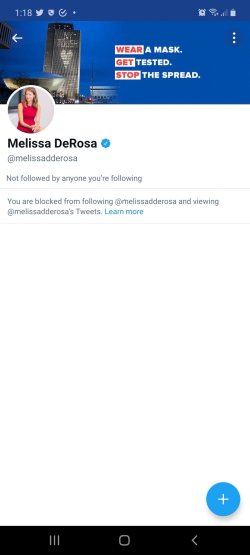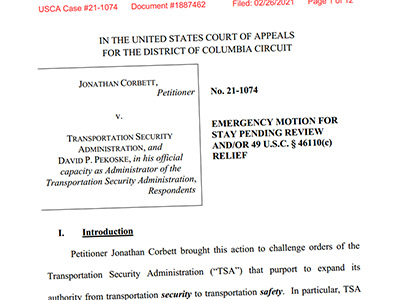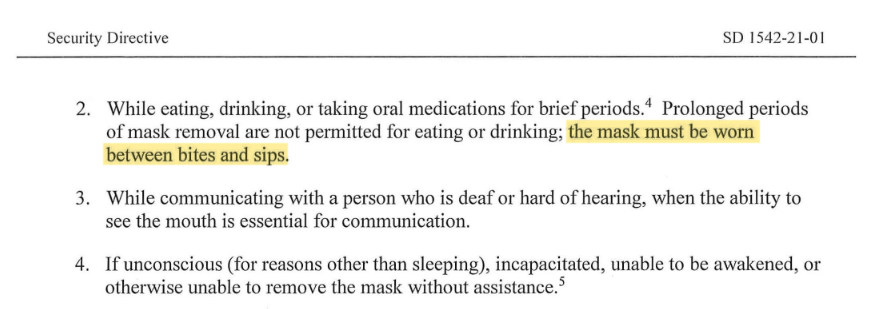In December, a 3-judge panel of the U.S. Court of Appeals for the District of Columbia Circuit emphatically tossed my challenge to whether TSA has the authority to create public health regulations. Two of the judges ruled that TSA has authority over both “security and safety” while the third judge would have held that I had no standing to even make the challenge.
I intended to chalk up my loses and leave the case at rest, but on January 13th, 2022, with 11 days left for me to ask the D.C. Circuit to change their minds, the U.S. Supreme Court decided NFIB v. OSHA, 595 U.S. __ (2022) (Case No. 21A244), in which they were asked to consider a challenge to the Occupational Safety and Health Administration’s rule requiring all employers across the country who have at least 100 employees to force their employees to either vaccinate or wear a mask and test weekly. The Supreme Court enjoined OSHA from enforcing the rule:
The Solicitor General does not dispute that OSHA is limited to regulating “work-related dangers.” She instead argues that the risk of contracting COVID–19 qualifies as such a danger. We cannot agree. Although COVID–19 is a risk that occurs in many workplaces, it is not an occupational hazard in most. COVID–19 can and does spread at home, in schools, during sporting events, and everywhere else that people gather. That kind of universal risk is no different from the day-to-day dangers that all face from crime, air pollution, or any number of communicable diseases.
I had argued in my case that the Transportation Security Administration was limited to security matters (terrorists, criminals, and the like) and that regulating safety matters (accidents, natural disasters) is outside of their powers. But the OSHA case made clear that even if an agency has authority over safety, they still do not have authority over matters of general public health. That is, OSHA has authority over occupational safety, and so it follows that TSA, if it has any authority over safety at all, has authority over transportation safety. In other words, just as TSA obviously doesn’t control whether a sidewalk at the airport is slippery, or whether the terminal is painted with lead paint, or whether exposure to UV rays at 35,000 feet should be limited to reduce cancer risks, they do not get to address coronavirus absent a special risk to transportation.
Could they create a regulation that requires masks at security checkpoints due to the special transportation-related risk created by the close proximity required to search travelers? Could be. Could they possibly do a study and conclude that the density of travelers on airplanes creates a special transportation-related risk, and thus require masks on airplanes? Maybe (although the advanced air filtration systems on passenger planes may mitigate that risk). But can they possibly continue to defend a regulation requiring me to wear a mask while shopping at the duty free or eating at the food court? It seems to me that the OSHA case forecloses that possibility.
My petition for re-hearing or re-hearing en banc was filed late Monday night. It is likely that the court will respond in a few weeks.
Corbett v. TSA – Petition for Re-Hearing (.pdf)
PS – Court clerks apparently read this blog last month and bunched their panties due to the name of the blog. I do detail the rationale behind the “Professional Troublemaker” name. It would be nice if the law were decided not based on whether one is pro- or anti-mask/vax/mandate/whatever or by trying to judge the attorney who filed a petition and instead decided strictly based on what the law says. Trying to stretch the powers of the agency created to prevent the next 9/11 to cover public health matters is foolish and entirely unnecessary: even if you like a mask mandate, let the agencies which actually do have authority make it.
 But the right has far from an exclusive claim on censorship, as well as on the use of Twitter to communicate with the public. N.Y. Governor Andrew M. Cuomo, the man who ordered nursing homes to accept COVID patients to avoid using the USNS Comfort provided by Trump, resulting in many thousands of dead seniors,
But the right has far from an exclusive claim on censorship, as well as on the use of Twitter to communicate with the public. N.Y. Governor Andrew M. Cuomo, the man who ordered nursing homes to accept COVID patients to avoid using the USNS Comfort provided by Trump, resulting in many thousands of dead seniors,  It seems that masks reduce transmission of coronavirus: some studies showing reduction of
It seems that masks reduce transmission of coronavirus: some studies showing reduction of 
